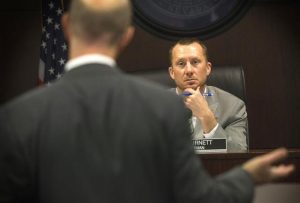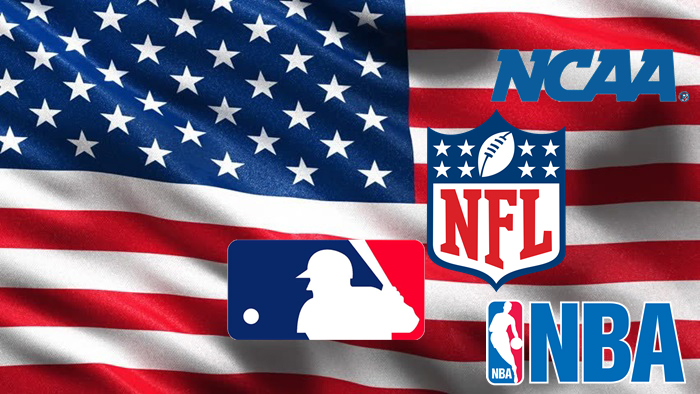Additional reporting by K. Morrison
This is part two of a two-part series wherein we interview AG Burnett, former Chairman of the Nevada Gaming Control Board (NGCB) and now a partner in the Gaming & Administrative Law Group McDonald Carano.
In part one, we introduced Mr. Burnett and got his thoughts and feelings on a number of issues including:
- A single national sports betting law, or state-by-state
- Regulator integrity in a political climate
- The wisdom of creating new regulatory bodies for sports betting
Without further ado, our interview continues below…

World Casino News (WCN): The four segments of legal casino gambling industry in the US [not counting sports betting or lottery tickets], already generate annual revenues in excess of $70 billion. The American Gaming Association estimated that Americans wager roughly $154 billion a year on sports illegally. Considering the extent of the market that operates offshore and on the street, what would be the incentive for online operators and illegal bookies to come in from the dark and work under federal or state regulators?
AG Burnett (AG): There is a great burden to overcome when one has to get a state gaming license. The investigations are thorough and in-depth; the ongoing requirements post-licensure are strict. When an already-existing black market business is regulated, you’ve got two choices, don’t you? Either come in from the cold and get a license, or go back into the shadows and disappear. The illegal bookies and offshore non-licensed operators have that choice. Regulation means the illegal operators eventually become extinct, or so small that they might as well be.
(WCN): While there’s really no way yet to project how much of the billions currently bet underground and flowing offshore can be captured for state or federal revenues, do you have an opinion on how that money should be spent in regard to funding regulators?
(AG): It would be up to each individual state, but I would assume revenues from sports betting will be commingled with other gross gaming revenues, and distributed accordingly.
(WCN): In a survey conducted by the Mellman Group from January 28th – February 11th, 2018, (PDF) where they examined the pervasiveness of paid-entry sports betting pools in America, they found that nearly one-quarter of American adults participated in a pool in 2017, with their total spent across all sports nearly $18 billion. NCAA basketball pools alone generated more than $2.6 billion in entry fees over the past year. Do you think there should be some separation between professional and college-level sports betting and if so what would that look like?
(AG): Years ago we went through a similar analysis in Nevada. Eventually the state regulators allowed betting on college sports. To date, I cannot think of one scandal since that time that has occurred that involved legal, regulated, sports betting. The sports betting licensees are in the business of wagering; they stand to lose everything if they do it wrong and if a regulators takes their license. They have become the first line of defense in sports integrity. They are the ones who have the expertise to notice shifts in betting patterns or other types of suspicious wagers. They have a duty to report that to the regulators, and that’s when the whole law enforcement mechanism kicks in. So no, I don’t see the need for any such separation. The protections are there and are the same for both.
(WCN): Do you see the potential for an uptick in match-fixing with more players and new operators entering the market? Do you believe the sports leagues should be granted licensing rights and royalties from all legal bets? Is the NBA and MLB 1% tax, or “integrity fee” a viable option or does the concept need more work to accomplish its primary goal of integrity monitoring?
(AG): I do not see that potential, as long as states legalize and regulate sports betting like Nevada does. The college teams and pro teams already have strong mechanisms in place to educate players, staff, coaches, and all relevant stakeholders on gaming. I assume those protections have been in place for a long time. As long as everyone is on the same page, which I believe they are, this can be done and done right.
(WCN): Thank you again, AG, for taking the time to share your thoughts and vision with our readers. Our team certainly has a better understanding of what’s at stake and what to look for as things develop. Could you be a little more specific on whether a 1% league fee is needed at all and if it would help or harm the industry?
(AG): Anything that takes from the handle is going to kill legitimate, regulated sports businesses. That will leave the illegal operators in the same position they are now: Thriving. Taking a percentage of handle is like taking a percentage of coin-in on a slot machine.
When states move to regulate, monitor, and ensure licensed books are operating in compliance with the law, things seem to be solved on the gaming side. In fact, I would argue that there is great benefits in looking at how gaming is regulated, and perhaps taking some of those notions and installing them within an organization that may have concerns about illegal betting or other activities.
While there is a great deal of money to be made on legal sports betting, just how much money is at stake is debatable.
American Gaming Association (AGA) CEO, Geoff Freeman’s recent letter to Congress in support of state level regulation, a secure betting system, and replacing the illegal market, cites an AGA estimate of $150 billion a year in illegal betting.
That number is much too high according to a report in MarketWatch. Economist, Jay L. Zagorsky, explains in detail why $67 billion is a more realistic number based on a US betting market on par with the UK’s, and adjusting for currency and population.
One thing nearly all of the experts agree on, is that a single federal betting law is unnecessary and possibly counter-productive. The Supreme Court opened the new state marketplaces on a Constitutional issue of state’s rights, and from what we’ve learned since the ruling, the states are more than ready to deal with regulating their own commerce, bringing in experts to handle nuances in crafting the laws where necessary.
Sports betting is just about the last thing on federal lawmakers’ minds right now and the states are moving ahead without them. When the new House and Senate are seated in January 2019, they could consider modifying the Wire Act of 1961 to make interstate sportsbetting legal – but don’t count on it.



